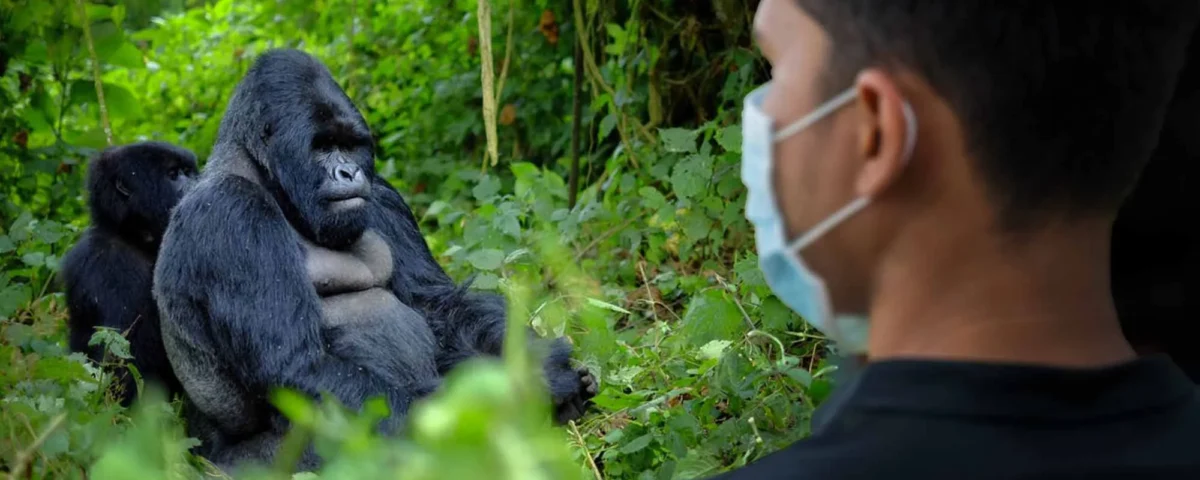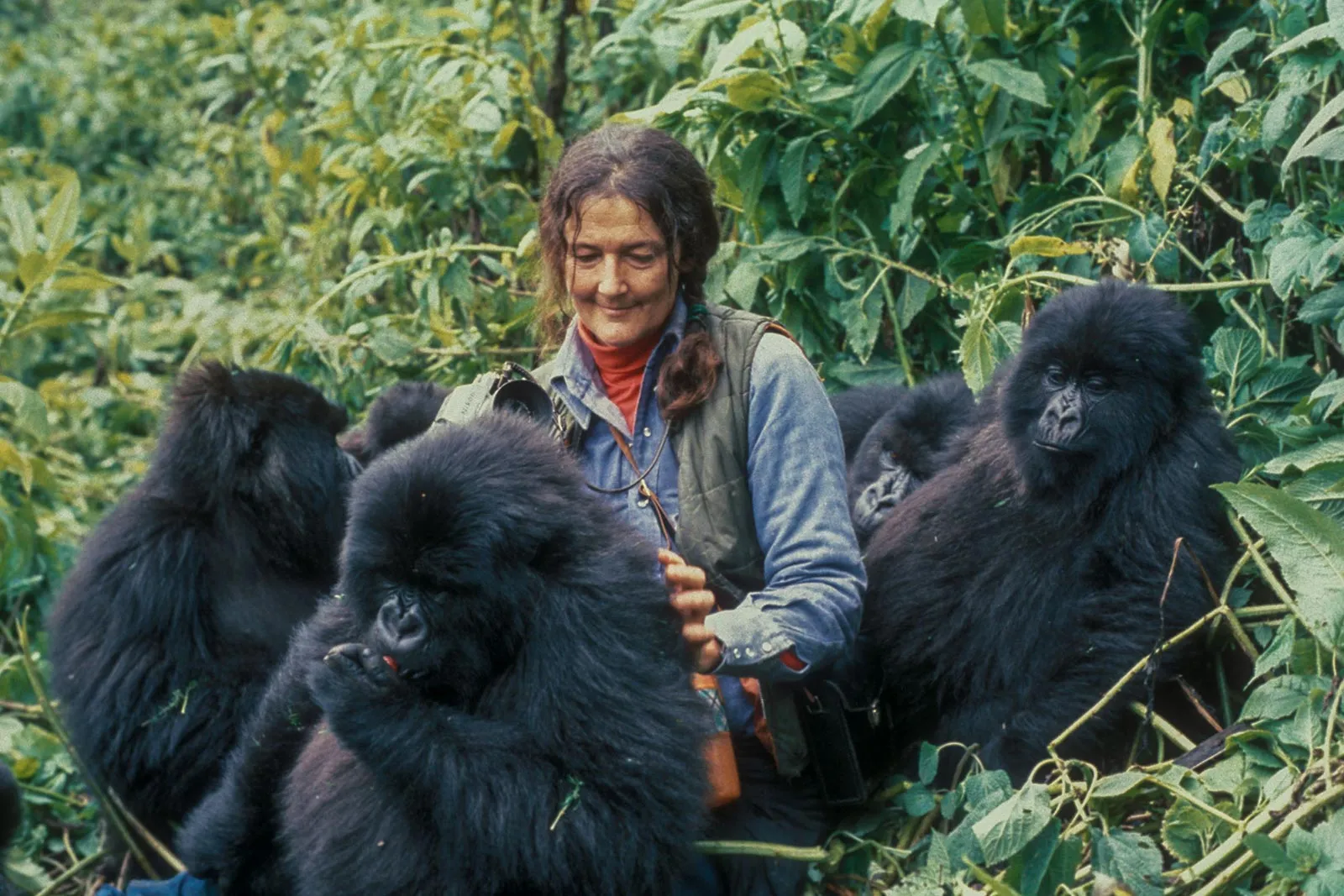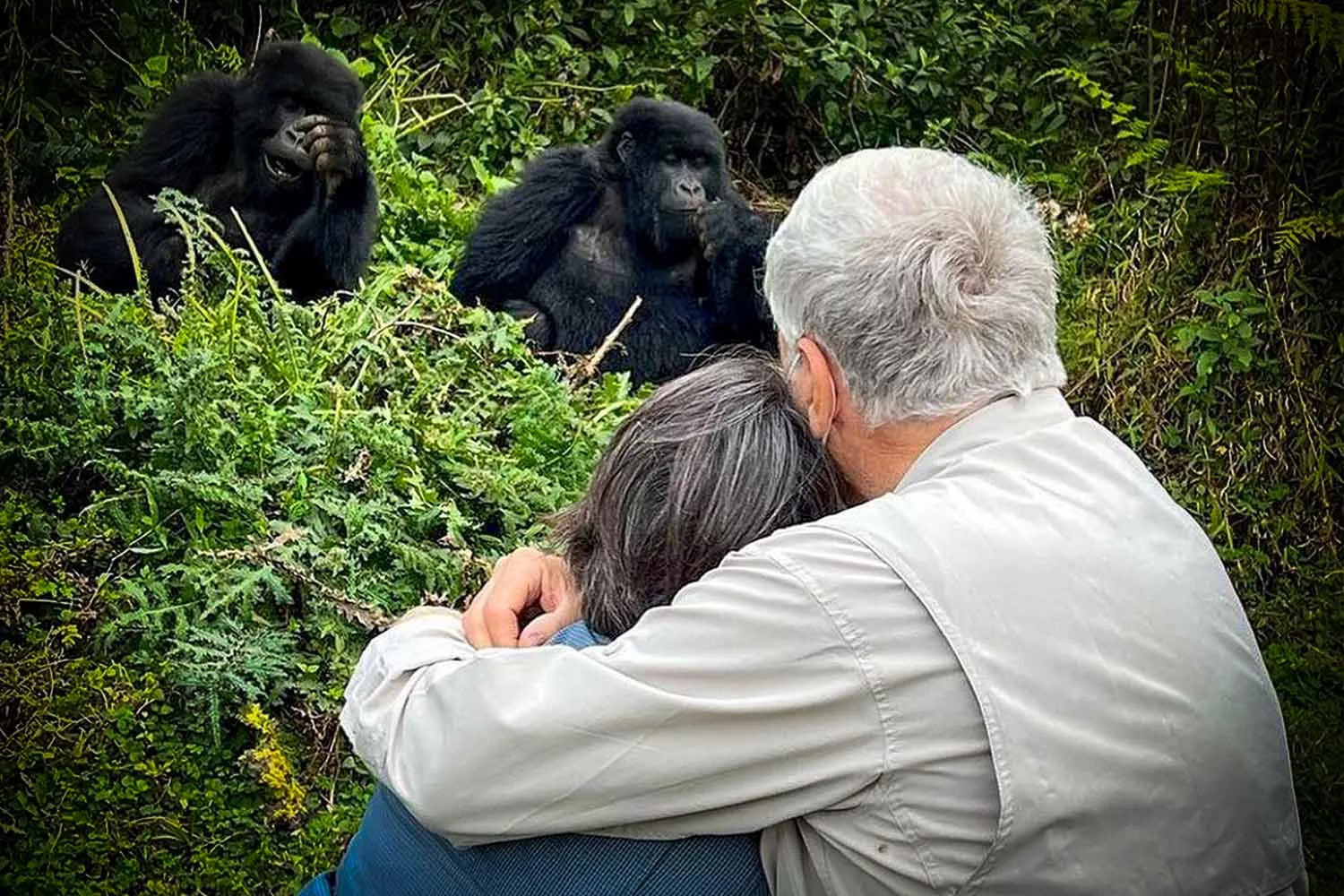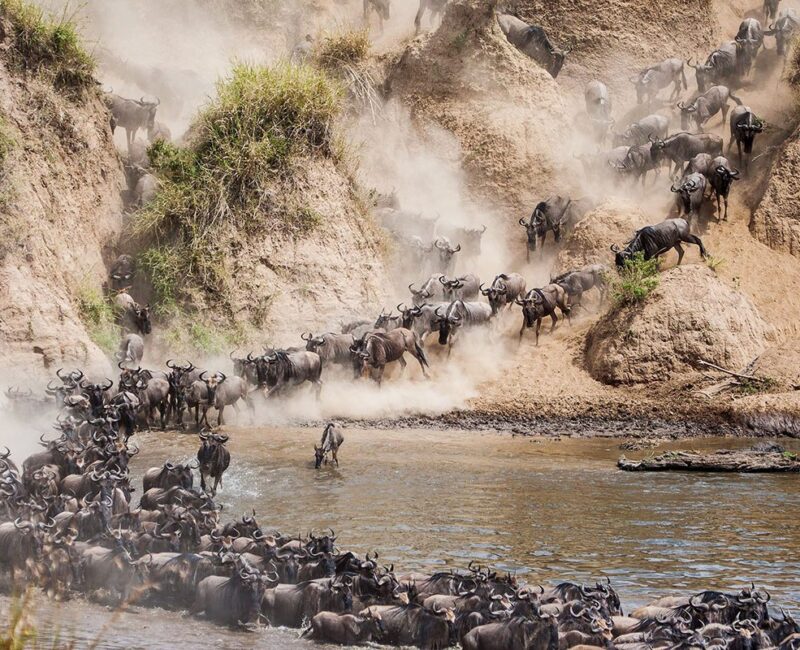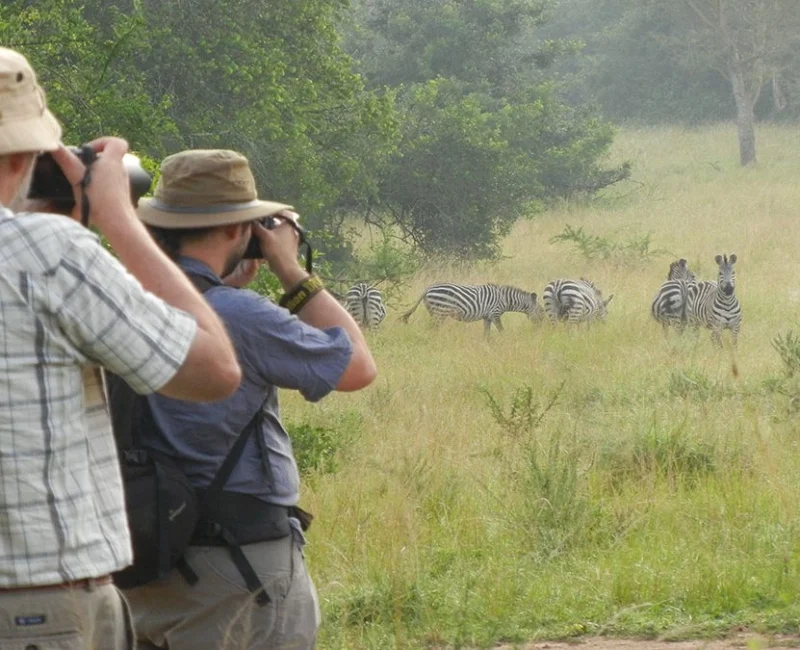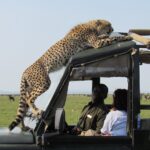
Are Guides Included in Wildlife Safari Packages?
October 21, 2025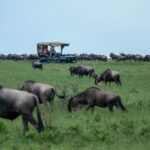
Are Night Game Drives Offered During the Migration Season?
October 21, 2025Are Health Measures Different for Primate-Focused Safaris?
When travelers ask, Are health measures different for primate-focused safaris?, they are often concerned about how visits to wildlife-rich areas like Uganda, Rwanda, or Tanzania require specialized precautions. Primate-focused adventures, including Rwanda Gorilla Trekking Safaris and Tanzania Chimpanzee Tracking Safaris, differ significantly from traditional Kenya Wildlife Safaris or Tanzania Wildlife Safaris in terms of health risks and preventive measures. This is due to the close proximity to endangered species such as mountain gorillas, chimpanzees, and other primates, which are highly susceptible to human-borne diseases.
Introduction: Understanding Health Considerations on Primate-Focused Safaris
Understanding these differences is essential for both the safety of travelers and the protection of wildlife. Health measures for primate safaris typically include vaccinations, disease prevention protocols, and strict hygiene rules. For example, travelers are often required to maintain a minimum distance of seven meters from gorillas during Rwanda Gorilla Trekking Safaris to minimize the transmission of respiratory illnesses. Similarly, Tanzania Chimpanzee Tracking Safaris in Mahale or Gombe National Parks require health screenings and adherence to specific guidelines to prevent disease spread among these highly sensitive populations.
Integrating primate safaris with traditional Kenya Safaris, Kenya Wildlife Safaris, or Kenya Birding Safaris requires careful planning to ensure continuity in safety measures. Additionally, travelers combining Uganda Gorilla Trekking Safaris with wildlife or birding experiences benefit from guidance provided by professional safari operators like Nkofu Africa Safaris, who specialize in multi-country, multi-activity itineraries that meet global health standards. Understanding these protocols ensures a safe, responsible, and rewarding primate-focused safari experience while preserving the integrity of East Africa’s unique ecosystems.
Vaccinations and Preventive Health Measures for Primate Safaris
A key question is, Are health measures different for primate-focused safaris compared to general wildlife safaris? The answer is yes. While general Kenya Safaris or Tanzania Safaris require standard vaccinations such as yellow fever, hepatitis A, and typhoid, primate-focused safaris necessitate additional precautions. Health authorities recommend staying current on routine immunizations and may advise extra vaccinations depending on the region, such as meningitis or rabies in areas with high wildlife interaction.
For Rwanda Gorilla Trekking Safaris, visitors must undergo health screening for symptoms of contagious diseases. This protocol minimizes the risk of transmitting respiratory infections to gorilla populations, which are highly susceptible due to genetic similarities with humans. Similarly, Tanzania Chimpanzee Tracking Safaris demand strict compliance with hygiene measures, including frequent handwashing and the use of masks when approaching primate habitats. Such measures are unique to primate safaris and differ significantly from typical Kenya Wildlife Safaris, where large mammals are less vulnerable to human-borne illnesses.
Travelers combining primate experiences with Kenya Birding Safaris or Kenya Cultural Safaris must account for the varied health requirements across parks. Professional operators like Nkofu Africa Safaris provide detailed guidelines and checklists to ensure guests meet all vaccination and preventive standards. Understanding these differences not only safeguards visitors’ health but also reinforces responsible eco-tourism practices, which are essential for protecting endangered primates while enhancing the credibility and authority of your safari experience.
Hygiene Protocols and Disease Prevention
Many travelers ask, Are health measures different for primate-focused safaris in terms of hygiene and disease prevention? The answer lies in the strict guidelines implemented to protect vulnerable primate species. Unlike Kenya Wildlife Safaris or Tanzania Wildlife Safaris, which primarily involve observation of large mammals from vehicles or open spaces, primate trekking requires close encounters in dense forests, increasing the risk of disease transmission.
During Rwanda Gorilla Trekking Safaris, visitors are required to wear masks, sanitize hands regularly, and maintain a minimum distance of seven meters from gorilla families. Guides monitor groups to ensure compliance, and sick travelers are typically advised to postpone their visit. For Tanzania Chimpanzee Tracking Safaris, strict adherence to hygiene protocols prevents contamination of forest habitats, safeguarding both visitors and primates. These measures contrast with standard Kenya Best Safaris, where interaction with wildlife does not require such stringent personal hygiene protocols due to minimal disease transmission risks from humans to large mammals.
Additionally, professional safari operators integrate sanitation measures into accommodation and transport logistics. Vehicles, tents, and lodges are disinfected regularly, particularly in areas accessed by both primates and humans. Travelers combining primate safaris with Kenya Cultural Safaris or Kenya Birding Safaris benefit from holistic health measures that maintain the safety of multi-activity itineraries. Such protocols ensure responsible tourism practices, protecting endangered species while offering a seamless and professional East African safari experience.
Nutrition, Hydration, and Physical Preparedness
Another critical consideration is, Are health measures different for primate-focused safaris regarding nutrition and physical preparedness? Primate safaris like Rwanda Gorilla Trekking Safaris and Tanzania Chimpanzee Tracking Safaris often involve long treks in steep or dense terrain, demanding higher levels of physical fitness and adequate nutrition. Unlike traditional Kenya Wildlife Safaris, where game drives are vehicle-based, primate safaris require walking through forests, muddy trails, and varying altitudes, which can pose risks for travelers unprepared physically.
To mitigate health risks, operators recommend proper hydration, energy-rich meals, and lightweight but supportive footwear. Visitors are advised to carry essential items such as water bottles, snacks, and first aid kits, ensuring they can sustain energy throughout the trek. Professional guides monitor group health, pace, and resting intervals to prevent exhaustion or heat-related illnesses. Travelers combining primate trekking with Kenya Birding Safaris or Kenya Cultural Safaris should consider these physical requirements when planning multi-day itineraries to avoid fatigue and ensure a comfortable, safe experience.
Understanding the unique physical demands of primate safaris reinforces the importance of customized planning, allowing travelers to maximize their experience without compromising safety. By preparing for nutritional and physical needs, tourists can fully engage in immersive wildlife observation and cultural activities, creating a balanced and memorable adventure that aligns with the standards of Kenya Best Safaris and Tanzania Safaris.
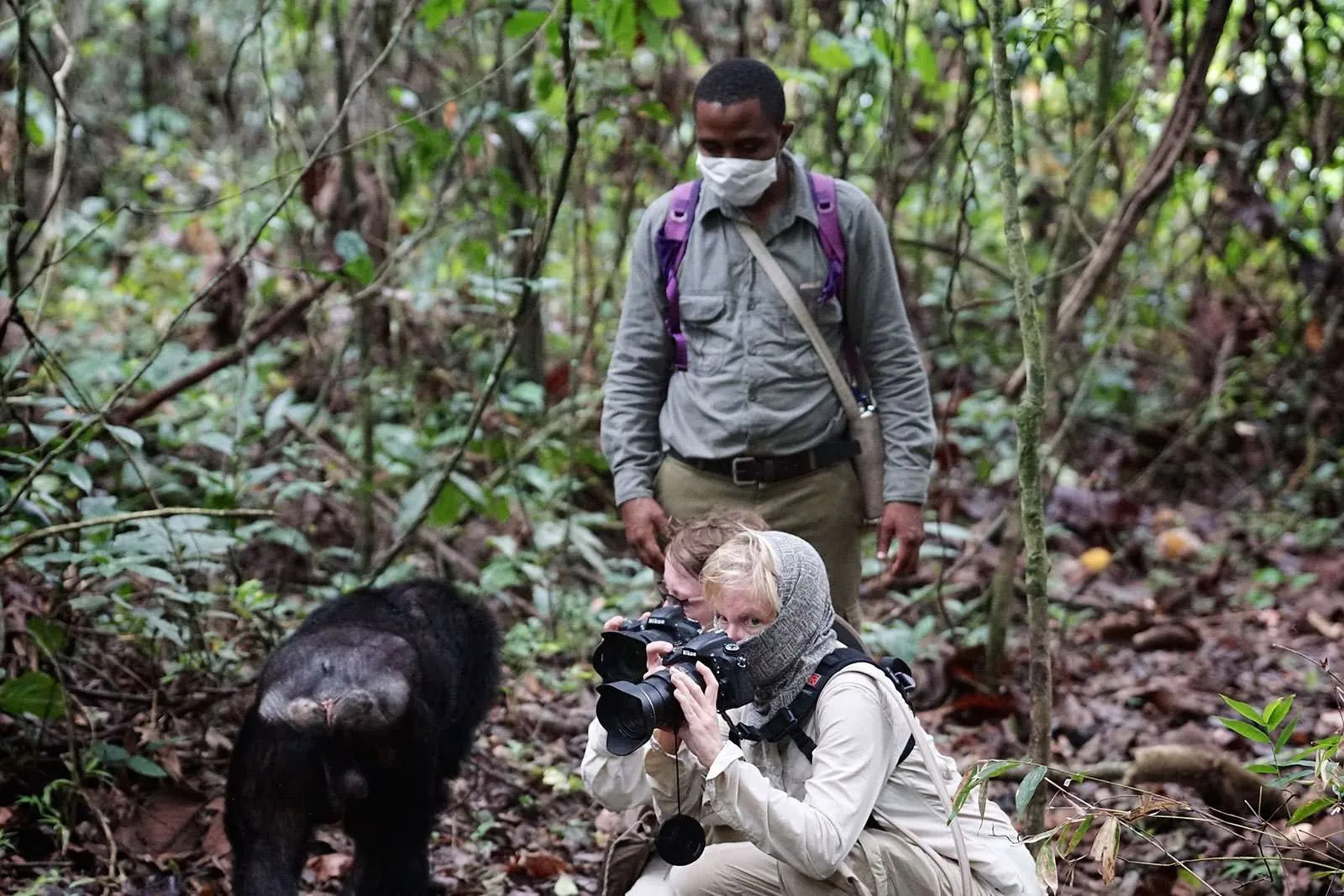
How Close Can I Get to the Chimpanzees?
Travel Insurance and Emergency Preparedness
Travelers frequently ask, Are health measures different for primate-focused safaris regarding travel insurance and emergencies? Indeed, primate-focused adventures require comprehensive coverage due to the higher risk of injury or illness in remote forest areas. Rwanda Gorilla Trekking Safaris and Tanzania Chimpanzee Tracking Safaris often take place in regions far from major medical facilities, making travel insurance essential for covering medical evacuation, accidents, or illness during treks.
Insurance plans should include coverage for altitude sickness, tropical diseases, and emergency evacuation by air if necessary. Unlike standard Kenya Wildlife Safaris, where park lodges are often close to towns with medical services, primate safaris demand preparation for emergencies in remote areas. Professional operators like Nkofu Africa Safaris coordinate with local health providers and ensure that guides carry communication devices and first aid supplies to address immediate needs.
For travelers combining primate safaris with Kenya Birding Safaris, Kenya Cultural Safaris, or Tanzania Safaris, insurance planning ensures coverage across multiple destinations. This approach safeguards both travelers and wildlife, allowing for peace of mind during the physically demanding and ecologically sensitive experiences that define East Africa’s primate-focused adventures.
Combining Primate Safaris with Other Activities
A common question is, Are health measures different for primate-focused safaris when combining with other activities? Travelers often want to integrate Rwanda Gorilla Trekking Safaris or Tanzania Chimpanzee Tracking Safaris with Kenya Safaris, Tanzania Safaris, Kenya Birding Safaris, or Kenya Cultural Safaris. In such cases, the health protocols for primate trekking set the standard across the itinerary to minimize risks of disease transmission and maintain traveler safety.
Combining multi-activity safaris requires careful planning, including staggered vaccination schedules, adherence to hygiene protocols, and monitoring physical exertion levels. Operators ensure seamless transitions between primate-focused and vehicle-based wildlife experiences, while also incorporating cultural visits, birding walks, and gorilla-friendly forest trails. These measures maintain the integrity of each activity and address the unique health requirements of primate encounters.
Proper coordination allows travelers to enjoy a diverse, immersive East African safari while meeting the heightened health standards of primate trekking. By following professional guidance, participants gain the confidence to engage fully in wildlife observation, birding, and cultural exploration while safeguarding themselves and the endangered primate populations.
Responsible Tourism and Ethical Considerations
Many travelers ask, Are health measures different for primate-focused safaris in terms of ethical and responsible tourism? The answer is unequivocally yes. Health measures on primate-focused safaris are intertwined with ethical obligations, as human-borne diseases can severely impact endangered species like mountain gorillas or chimpanzees. Rwanda Gorilla Trekking Safaris and Tanzania Chimpanzee Tracking Safaris enforce strict guidelines not only to protect human health but to ensure the long-term survival of primates in their natural habitats.
Responsible tourism practices include limiting the number of visitors per gorilla group, maintaining safe distances, wearing masks, and following guided paths to reduce habitat disturbance. These measures are unique to primate safaris and are not typically required for Kenya Wildlife Safaris, Tanzania Wildlife Safaris, or Kenya Birding Safaris, where human impact is less direct. By adhering to these standards, travelers contribute to conservation efforts, support local communities, and enhance the reputation of East African safaris as professional, sustainable experiences.
Conclusion: Preparing for a Safe and Rewarding Primate Safari
So, Are health measures different for primate-focused safaris? Absolutely. From vaccinations and hygiene protocols to physical preparation, insurance planning, and ethical practices, primate-focused safaris such as Rwanda Gorilla Trekking Safaris and Tanzania Chimpanzee Tracking Safaris require additional health considerations compared to standard wildlife or birding safaris.
By understanding and adhering to these measures, travelers can combine primate safaris with Kenya Safaris, Tanzania Safaris, Kenya Birding Safaris, or Kenya Cultural Safaris, creating safe, immersive, and responsible multi-activity itineraries. Nkofu Africa Safaris ensures that guests receive professional guidance to meet all health and safety requirements, allowing them to enjoy the thrill of gorilla encounters, chimpanzee tracking, and East Africa’s rich wildlife and cultural landscapes.
Ultimately, proper health measures protect both travelers and endangered species, enabling a safe, ethical, and unforgettable safari experience that reinforces East Africa’s status as a premier global wildlife destination.

